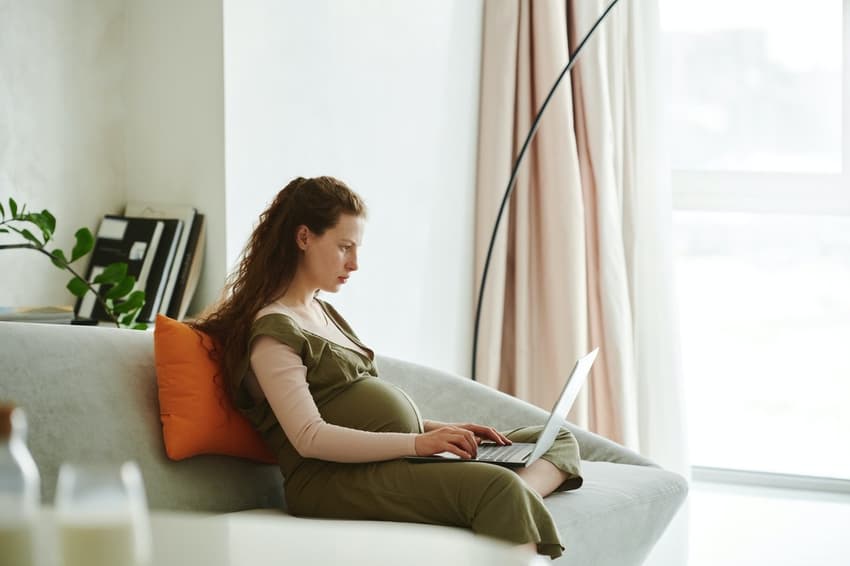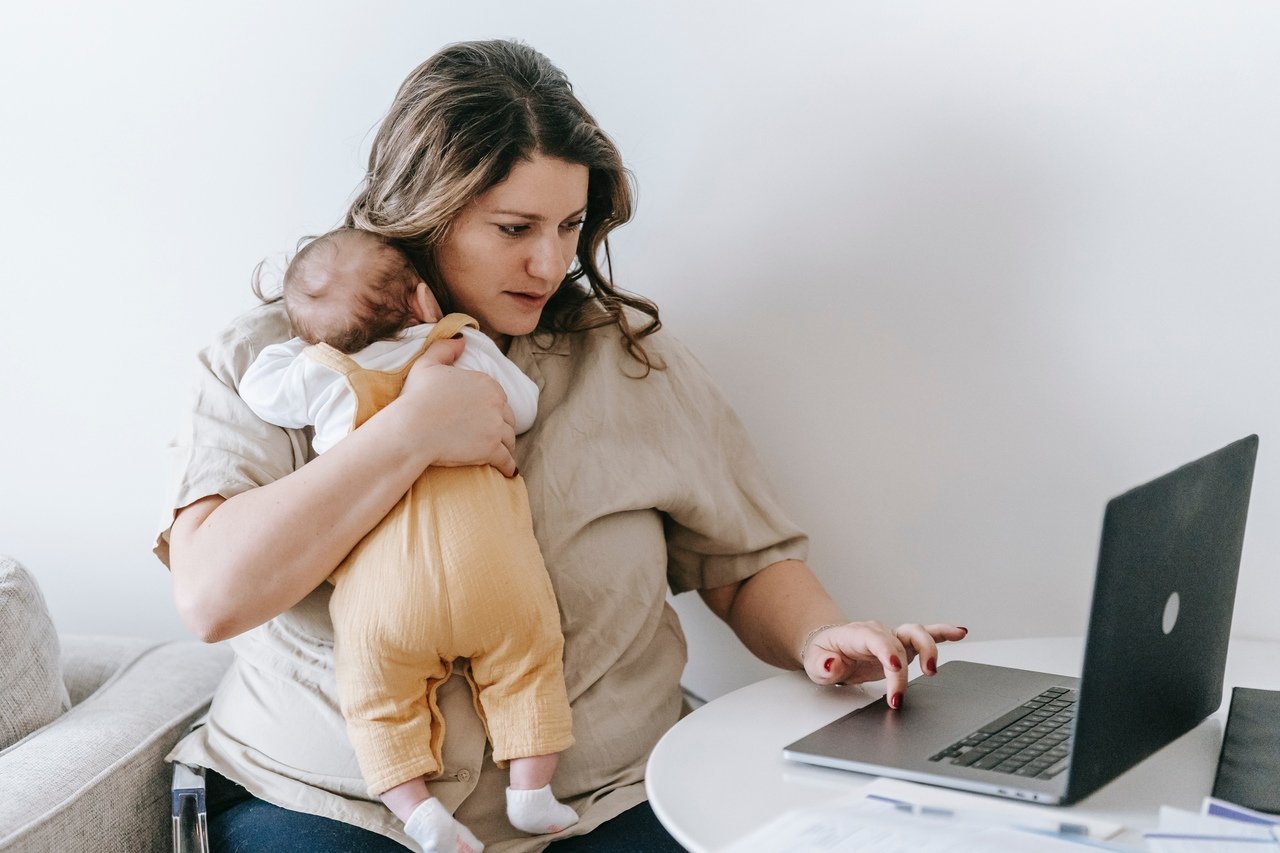What maternity benefits are you entitled to as a freelancer in Germany?

While employees in Germany are entitled to maternity leave and maternity pay, freelancers have to navigate a different set of rules and considerations.
Being self-employed can be a liberating and exciting career choice. But, while self-employed people enjoy the flexibility and independence of working for themselves, when it comes to maternity benefits, the situation is more difficult than for traditional employees in Germany.
Here’s what maternity benefits self-employed women in Germany are entitled to and what they should be aware of during pregnancy and childbirth.
No automatic Mutterschutz
Under German law, employees are entitled to maternity leave six weeks before and eight weeks after childbirth, during which time they receive maternity pay - 100 percent of their salary. A maximum of €13 per day is paid by their health insurance provider and the rest is topped up by the employer.
Employed mothers-to-be are legally obliged to take the two months after birth off work completely and can only work during the six weeks before the birth with the express consent of their employer.
READ ALSO: 7 tips for how to survive as a freelancer in Germany
However, this protection period doesn’t apply to self-employed mothers – they are allowed to work right up to and immediately after the birth of their child, and they are not automatically entitled to the Mutterschutz benefit.
But, if you are a self-employed new mother with statutory health insurance and you have been paying the extra monthly Krankengeld (sickness benefit) insurance at least six weeks prior to the birth of your child, you can receive maternity benefits or Mutterschaftsgeld (also referred to as Mutterschutzgeld).

Freelancers can work straight away after becoming a mother. Photo: Sarah Chai/Pexels
Self-employed mothers can then receive 70 percent of their income from their health insurer through Mutterschaftsgeld and, while receiving these maternity benefits, they are exempt from having to pay health insurance contributions.
So, if you are planning to have a child as a freelancer, you should plan well in advance to be covered for sickness benefits, ideally before pregnancy. Those who are insured with statutory health insurance but only pay the reduced contribution rate (without Krankengeld) are not entitled to maternity benefits.
Do you have to apply for Mutterschutzgeld?
If you are a freelancer and insured with a statutory health insurer and have paid the additional tariff for Krankengeld, you can apply for maternity benefits from your health insurance fund. You can submit the application no earlier than in the 33rd week after your pregnancy is confirmed by your gynaecologist or midwife.
READ ALSO: More money and less bureaucracy: How Germany wants to change its child benefits system
Self-employed women who are insured through the Künstlersozialkasse (KSK) are also entitled to maternity benefits. The application is made through your health insurance fund, but the KSK must be informed about the receipt of maternity benefits. After giving birth, you have to inform the KSK within eight weeks, during the so-called protection period, whether you will return to work after the deadline. You will not have to pay your monthly contribution payments to the KSK while receiving Mutterschutzgeld.
Private Health Insurance
For self-employed women with private health insurance, the situation differs. Many private insurers exclude daily sickness benefits during the maternity protection period, though some might offer a one-time maternity pay of approximately €200.
READ ALSO: Could it soon get harder to get private health insurance in Germany?
Given the income reduction during maternity leave, it might be worth considering switching to a statutory health insurer before having a child.
Social welfare assistance
In cases where self-employed women face financial challenges due to pregnancy and childbirth, there is an option to seek assistance from the social welfare office. This assistance is directed towards personal circumstances rather than business support.
Parental allowance and child benefit
The good news is that self-employed women in Germany are eligible for parental allowance - Elterngeld - which amounts to 67 percent of their income up to a maximum of €1,800 per month. The calculation is based on the profit earned after tax deductions, often using the latest tax assessment. In cases where the tax assessment is unavailable, an income and expenditure statement can be used.

Children ride tricycles at a German kindergarten. Photo: picture alliance/dpa/mauritius images / Westend61 / M | Westend61 / Mareen Fischinger
For self-employed women, parental allowance is paid immediately after birth, unlike employees who receive it after the maternity protection period. When receiving maternity benefits, the entitlement to parental benefits is reduced by two months.
READ ALSO: Germany to cut parental allowance for higher-earning families from 2024
However, as The Local has been reporting, Germany's government is planning to cut the threshold for Elterngeld allowance from 2024, so that couples earning a combined total of more than €150,000 per year will no longer be eligible for the benefit.
Paying for health insurance
If you're employed, you don't have to pay health insurance during your maternity leave.
If you are a freelancer and an insured member of statutory health insurance, you usually continue to pay contributions during parental leave - though this may be at a lower rate.
If you have statutory health insurance but would be eligible for family insurance, you are exempt from paying health insurance contributions during your maternity leave. This means you do not have to pay contributions if your spouse is also insured under statutory health insurance, and you meet the requirements for family insurance. However, if your spouse is privately insured, their income is taken into account when calculating your contributions.
Child Benefit
Fortunately, being a freelancer doesn't exclude you from receiving Kindergeld (child benefit) either.
Almost every child living in Germany is entitled to Kindergeld, which can be applied for and received by one parent. The monthly payments amount to €250 per child per month and can be applied for immediately after the birth of the child. They can also be applied for retroactively, up to a maximum of 6 months after birth.
READ ALSO: What families in Germany need to know about Kindergeld's replacement from 2025
These monthly payments also go up depending on the number of children a person has. From 2025, however, Kindergeld will be replaced by Kindergrundsicherung - a basic child allowance - which will see parent's receive €250 per month per child and extra subsidies for low-income families.
Comments
See Also
Being self-employed can be a liberating and exciting career choice. But, while self-employed people enjoy the flexibility and independence of working for themselves, when it comes to maternity benefits, the situation is more difficult than for traditional employees in Germany.
Here’s what maternity benefits self-employed women in Germany are entitled to and what they should be aware of during pregnancy and childbirth.
No automatic Mutterschutz
Under German law, employees are entitled to maternity leave six weeks before and eight weeks after childbirth, during which time they receive maternity pay - 100 percent of their salary. A maximum of €13 per day is paid by their health insurance provider and the rest is topped up by the employer.
Employed mothers-to-be are legally obliged to take the two months after birth off work completely and can only work during the six weeks before the birth with the express consent of their employer.
READ ALSO: 7 tips for how to survive as a freelancer in Germany
However, this protection period doesn’t apply to self-employed mothers – they are allowed to work right up to and immediately after the birth of their child, and they are not automatically entitled to the Mutterschutz benefit.
But, if you are a self-employed new mother with statutory health insurance and you have been paying the extra monthly Krankengeld (sickness benefit) insurance at least six weeks prior to the birth of your child, you can receive maternity benefits or Mutterschaftsgeld (also referred to as Mutterschutzgeld).

Self-employed mothers can then receive 70 percent of their income from their health insurer through Mutterschaftsgeld and, while receiving these maternity benefits, they are exempt from having to pay health insurance contributions.
So, if you are planning to have a child as a freelancer, you should plan well in advance to be covered for sickness benefits, ideally before pregnancy. Those who are insured with statutory health insurance but only pay the reduced contribution rate (without Krankengeld) are not entitled to maternity benefits.
Do you have to apply for Mutterschutzgeld?
If you are a freelancer and insured with a statutory health insurer and have paid the additional tariff for Krankengeld, you can apply for maternity benefits from your health insurance fund. You can submit the application no earlier than in the 33rd week after your pregnancy is confirmed by your gynaecologist or midwife.
READ ALSO: More money and less bureaucracy: How Germany wants to change its child benefits system
Self-employed women who are insured through the Künstlersozialkasse (KSK) are also entitled to maternity benefits. The application is made through your health insurance fund, but the KSK must be informed about the receipt of maternity benefits. After giving birth, you have to inform the KSK within eight weeks, during the so-called protection period, whether you will return to work after the deadline. You will not have to pay your monthly contribution payments to the KSK while receiving Mutterschutzgeld.
Private Health Insurance
For self-employed women with private health insurance, the situation differs. Many private insurers exclude daily sickness benefits during the maternity protection period, though some might offer a one-time maternity pay of approximately €200.
READ ALSO: Could it soon get harder to get private health insurance in Germany?
Given the income reduction during maternity leave, it might be worth considering switching to a statutory health insurer before having a child.
Social welfare assistance
In cases where self-employed women face financial challenges due to pregnancy and childbirth, there is an option to seek assistance from the social welfare office. This assistance is directed towards personal circumstances rather than business support.
Parental allowance and child benefit
The good news is that self-employed women in Germany are eligible for parental allowance - Elterngeld - which amounts to 67 percent of their income up to a maximum of €1,800 per month. The calculation is based on the profit earned after tax deductions, often using the latest tax assessment. In cases where the tax assessment is unavailable, an income and expenditure statement can be used.

For self-employed women, parental allowance is paid immediately after birth, unlike employees who receive it after the maternity protection period. When receiving maternity benefits, the entitlement to parental benefits is reduced by two months.
READ ALSO: Germany to cut parental allowance for higher-earning families from 2024
However, as The Local has been reporting, Germany's government is planning to cut the threshold for Elterngeld allowance from 2024, so that couples earning a combined total of more than €150,000 per year will no longer be eligible for the benefit.
Paying for health insurance
If you're employed, you don't have to pay health insurance during your maternity leave.
If you are a freelancer and an insured member of statutory health insurance, you usually continue to pay contributions during parental leave - though this may be at a lower rate.
If you have statutory health insurance but would be eligible for family insurance, you are exempt from paying health insurance contributions during your maternity leave. This means you do not have to pay contributions if your spouse is also insured under statutory health insurance, and you meet the requirements for family insurance. However, if your spouse is privately insured, their income is taken into account when calculating your contributions.
Child Benefit
Almost every child living in Germany is entitled to Kindergeld, which can be applied for and received by one parent. The monthly payments amount to €250 per child per month and can be applied for immediately after the birth of the child. They can also be applied for retroactively, up to a maximum of 6 months after birth.
READ ALSO: What families in Germany need to know about Kindergeld's replacement from 2025
These monthly payments also go up depending on the number of children a person has. From 2025, however, Kindergeld will be replaced by Kindergrundsicherung - a basic child allowance - which will see parent's receive €250 per month per child and extra subsidies for low-income families.
Join the conversation in our comments section below. Share your own views and experience and if you have a question or suggestion for our journalists then email us at [email protected].
Please keep comments civil, constructive and on topic – and make sure to read our terms of use before getting involved.
Please log in here to leave a comment.